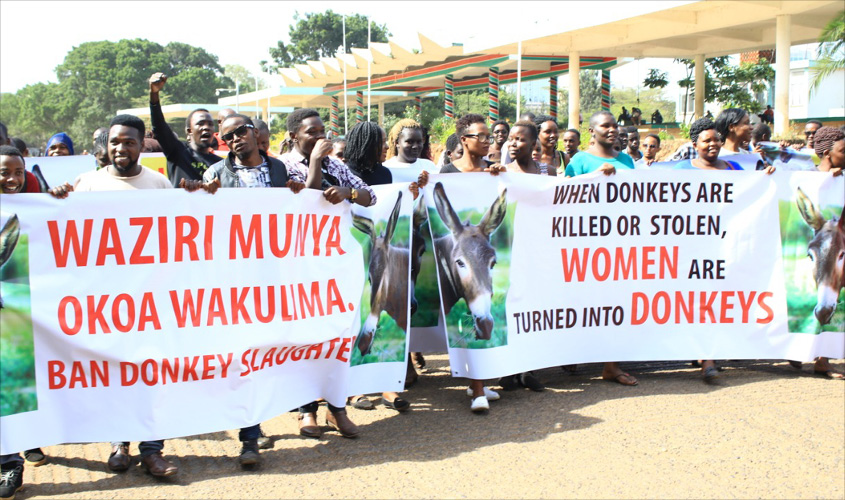Uhuru Kenyatta’s government has banned the commercial slaughter of donkeys in Kenya. The decision has been taken because of the donkey’s symbiotic role with women in village communities and the alarming shrinking population of donkeys.
Kenyan Agriculture Cabinet Secretary Peter Munya said, “Stealing of donkeys, wanton and unmitigated slaughter of donkeys, has led to drastic reduction in the donkey population.”
Donkeys are the beast of burden in Kenya; because of their strength and endurance donkeys can carry heavy loads and contribute to a family’s income in remote communities. If a family has no donkey it means the wife and the out-of-school children do the donkey work; the donkey provides the cash income for the family. A 2019 report by the Kenya Agricultural and Livestock Research Organisation (KALRO) found that the donkey ranked as more important compared to chickens, goats, sheep, cows and ducks. Kenya’s 1 million remaining donkeys are essential for water provision, agriculture, transport of people and goods as well as other income-generating activities; the average income per donkey in a rural community is US$110 per month.
Unfortunately, the demand for donkey skins from China led to 15% of the donkey population, nearly 400,000 donkeys, being slaughtered between 2016 and 2018 in four purpose-built export slaughterhouses. The animal welfare issues were a huge concern as up to 1,000 donkeys were being slaughtered every day, there was often a discrepancy between the numbers reported and the number of stunning bolts used. The mean slaughter rate was five times as much as the 11-13-month reproductive rate, which led to projections of all donkeys in Kenya being wiped out by 2023.
It is alleged that ejiao, the gelatine product made from soaking and boiling donkey skin and used in traditional Chinese medicine, can supplement lost blood, delay ageing, increase libido, treat side effects of chemotherapy, prevent infertility, miscarriage and menstrual irregularity. Amongst the emerging middle class in China, ejiao is an aspirational beauty ingredient that young family members buy for their grandparents. There is an argument that says traditional Chinese medicine should be entirely made from Chinese sourced ingredients. Would Chinese consumers be disappointed if they knew the ejiao was outsourced, and was ruining villages’ economies in Kenya?
Largely thanks to the work of Brooke-Action for Working Horses and Donkeys, who declared this situation a crisis in 2019, the illegal slaughtering trade in Kenya has been stopped.
Brooke is an international charity that protects and improves the lives of the working horses, donkeys and mules that give people in the developing world the opportunity to work their way out of poverty. It was set up in 1934 by Dorothy Brooke, the wife of a British cavalry officer, who travelled to Cairo in Egypt in 1930 to seek out the abandoned war horses of the First World War. Brooke’s chief executive Petra Ingram said, “This is also an important and vital step towards giving this issue the attention it deserves, and extending a ban across Africa and beyond.”
Whilst the ban is to be celebrated, there are fears that illegal trafficking of donkeys could continue to countries where donkey slaughter is legal. This process involves donkeys travelling in cramped and dangerous conditions without food or water. If the donkeys survive this journey, they are then subjected to often inhumane slaughter processes.
Botswana, Burkina Faso, Mali, Niger, Senegal and Ethiopia have already banned the slaughter of donkeys, but the trade continues in other countries including Brazil and Nigeria. In Pakistan, a ban has been in place since 2015 but there is ongoing talk of a possible project to supply donkeys to China. Brooke Pakistan is currently lobbying the government to ensure this does not happen.
Through the Covid-19 lens, consuming donkey skin gelatine carries potential risks of disease; the huge number of skins from various sources is transported in unhygienic conditions which could easily introduce disease to humans.
There are also bio-security issues, it is possible the skins are not always of donkeys and that pig skins are sometimes substituted. Traditional Chinese medicine manufacturer Dong-E-E-Jiao is reported to have donated over £100,000 worth of ejiao to Chinese hospitals in a bid to treat and prevent the spread of Covid-19.
The medicine, which is not proven to have any positive effect in tackling the virus, Brooke is issuing a stark warning about the risks of further spreading of viruses as more skins are transported from Africa, Asia and South America; Brooke fears the spread of another zoonotic disease

